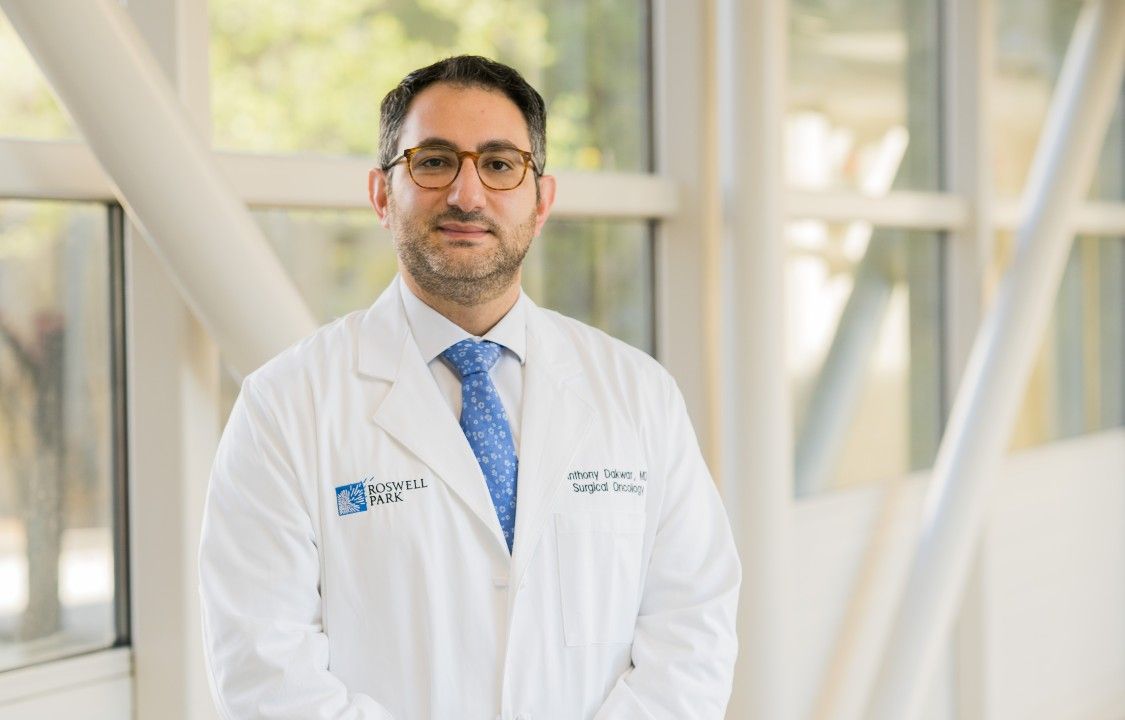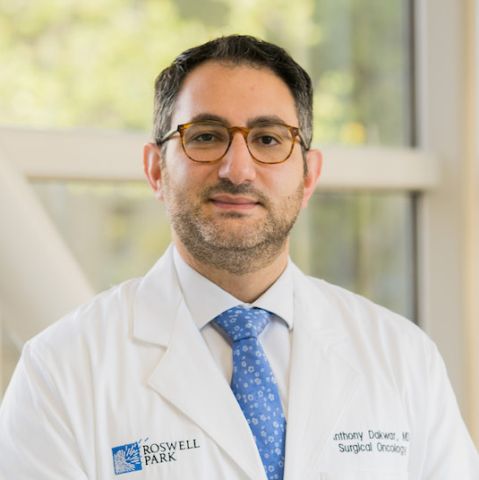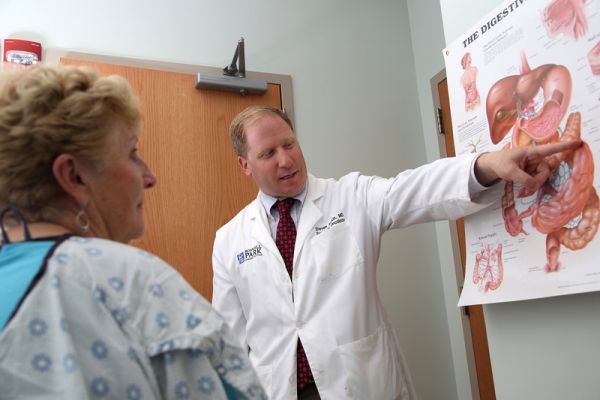What to learn about their experience, advanced options they provide and more — before deciding where to seek cancer care.
If you’ve been diagnosed with colorectal cancer, surgery may be a primary part of your treatment. These operations can be complicated, with potentially lifelong implications, so you’ll want to choose a colorectal surgeon and treatment center with the tools and expertise to offer you your best chance for positive outcomes in terms of both your survival and your quality of life.
How do you make that choice? Here are some questions to ask a potential colorectal cancer surgeon to help you find the right place for your cancer care.
1. Do I really need an operation?
While surgery is primary treatment for colon cancer, that’s not always the case. Patients with early-stage cancers, for example, may be able to have their tumor removed with an endoscopic procedure that reaches the tumor through the anus, avoiding external incisions. To a patient, the procedure is very much like the experience of having a colonoscopy. “At Roswell Park, thanks to our increased technical skill and cutting-edge instrumentation, we’re able to offer patients these other options and save them from a major operation," says colorectal surgeon Anthony Dakwar, MD, of Roswell Park Comprehensive Cancer Center, center of excellence for colorectal cancer care.
2. How many of these surgeries have you done?
Experience from performing a high volume of these complex operations matters and the correlation between the number of surgeries performed and the quality of care is well documented. A typical gastrointestinal surgeon may perform a wide variety of operations for many diseases and conditions, but fewer cancers. At Roswell Park, our colorectal surgeons focus on colorectal cancers every day.
You want a surgeon with a proven track record and a treatment center with a significant volume of procedures, but what does that mean? For colorectal procedures, it can mean a center that performs 11 to 100 operations each year. Roswell Park performs more than 200 colorectal cancer operations each year. For specifically rectal cancer, a high volume center is defined as 12-15 procedures a year; Roswell Park performs about 100, underscoring unique expertise and a commitment to maintaining high-quality outcomes for our patients.
3. Do you do robotic surgery for this?
Robotic or robot-assisted surgery uses a superior instrument for performing minimally invasive surgery, taking the precision of these intricate surgeries to a higher level. Robotic surgery results in smaller incisions, less pain, a shorter hospital stay, fewer complications and a speedier recovery. But robotic surgery also requires specialized training and experience. Roswell Park is a leader in robotic surgery for cancer and more than 90% of colorectal cancer surgeries are performed minimally invasively and robotically, more than any provider in the region.
In addition, we offer a procedure for patients with rectal cancer that uses robotic surgery and an endoscopic (through the anus) approach. Robotic transanal minimally invasive surgery (rTAMIS) is a relatively new, advanced procedure that means a far less aggressive operation for the patient. Dr. Dakwar is one of few gastrointestinal surgeons in the region trained and skilled to perform it.
Should you seek a second opinion?
You need an accurate diagnosis and evaluation by a multispecialty team that focuses on colon and rectal cancer every day.
4. Should I have chemotherapy or other treatment before surgery?
Possibly. For patients with rectal cancer, the latest evidence-based treatment approach means not having surgery first. Locally advanced rectal cancers are best treated first with either chemotherapy and/or chemoradiation (delivering both chemotherapy and radiation treatment together). This process of undergoing both chemotherapy and chemoradiation prior to surgery is called total neoadjuvant therapy. Some patients have a complete response to this tactic and can take a watchful waiting approach to delay or possibly avoid surgery altogether. Others find their tumor downgraded so that a less aggressive surgery is possible.
Some patients with colon cancer may benefit from systemic therapy such as chemotherapy and/or immunotherapy before surgery. These patients may include those who have metastatic colon cancer or have cancer that has spread or adhered to the bladder. “Systemic treatment can shrink the tumor size,” explains Dr. Dakwar, “making it amenable to a minimally invasive surgery rather than a traditional open one with a large incision. Patients with advanced cancers who may not have been a candidate for surgery may find their tumors have shrunk enough to be eligible for surgery.”
This is why being evaluated by a team of colorectal cancer experts right from the start is important. At Roswell Park, every patient is evaluated not just by a colorectal surgeon but by medical and radiation oncologists, plus other colorectal specialists who together determine which treatments are best for you — and the optimal sequence of those treatments.
5. Will I need a colostomy bag?
In the most common surgeries — colectomy for colon cancer and proctectomy for rectal cancer — the diseased portion of the colon or rectum is removed and the two healthy ends are reconnected. In some patients, reconnecting the ends cannot be done safely at the time, so the surgeon connects the colon to an opening created in the abdomen, a procedure called a colostomy. Stool then passes from the colon through the abdomen to be collected in a plastic bag or pouch worn on the outside of the body. This diversion may be temporary and reversed at a later time.
At Roswell Park, most colorectal patients avoid a permanent colostomy. “We’re able to offer other strategies, employ tools of neoadjuvant therapies, combined with our surgical skill set and mastery of robotic instruments, we can convert patients to less aggressive surgery, perform sphincter-preserving surgery, which means fewer patients needing colostomies,” says Dr. Dakwar.
6. Why does it matter to be treated at a comprehensive cancer center that’s designated by the National Cancer Institute?
This designation means quite a lot of impressive things, but for patients with colorectal cancer who need treatment now, it means you’re going to get better cancer care: advanced surgical options that are less aggressive, the latest drugs based on your tumor’s genetic profile, and nuanced, personalized care plans and that look ahead toward your quality of life for years to come.




